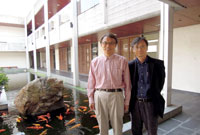Shih Chi-yu, National Taiwan University Shih Chi-yu is National Chair and University Chair in the Department of Political Science at National Taiwan University. He is currently teaching international relations theory, anthropology of knowledge, and China studies. He is the author of over 60 books, including Post-international Relationship Reconsidered: The Pre-modern Politics of Gongsun Long (2015); Harmonious Intervention: China's Quest for Relational Security (2014); Sinicizing International Relations: Self, Civilization and Intellectual Politics in Subaltern East Asia (2013); Civilization, Nation and Modernity in East Asia (2013); On China By India: From Civilization to Nation State (2012); Autonomy, Ethnicity and Poverty in Southwestern China: The State Turned Upside Down (2007), and Navigating Sovereignty: World Politics Lost in China (2003). The CUHK–Chiang Ching-kuo Foundation Asia-Pacific Centre for Chinese Studies (APC) launched the APC Visiting Scholar Scheme in 2015. The scheme invites renowned scholars in the area of East Asian studies to visit CUHK and to give public lectures in the subject area of Chinese studies in Southeast Asia. This year, Professor Shih Chi-yu was invited to be the APC Visiting Scholar. A public lecture themed "Cultural Chineseness, Ethnic Chineseness, and Post-Chineseness: The Chinese Studies in Southeast Asia Compared" was held on 13 October 2015. Professor Shih shared his recent research article, Reconnecting China: From Chineseness to Post-Chineseness, a summary of which is reproduced below. This study traces the unlikely positioning among the Chinese, the post-Western, and the Western agenda in Hong Kong and Taiwan. The irony of Mainlandization lies in its potential to re-world Hong Kong and Taiwan away from global liberalism that could also silence their different levels of Chineseness. A call for the recognition of the emergence of the post-Chinese identity follows. On the one hand, both former colonies share the grievance toward the incapacity of the Chinese IR to appreciate the post-Western sitedness, thus, suppressing the post-Western sensibilities. On the other hand, their peculiar appropriation of liberalism in the shared resistance to Chinese nationalism makes both quintessentially post-Western in actuality. Ultimately, Mainlandization attests to a process of post-Chinese identification, through which all are ready to recollect a certain shared culture that would lead to the recognition of one another as the same imagined Chinese, and yet are actually aware of the peculiarities in their self- and mutual understanding. Chineseness can be a misleading concept to the extent that it only attends to the difference among the Chinese populations anywhere. Chinese communities are indeed different from one another; nevertheless, they have yet to develop a curiosity about the differences. Post-Chineseness adapts to this non-existent curiosity and shifts the focus of research agenda to relationality. Relationality concerns the mechanism of reconnection among Chinese communities. They are all different, hence the designation of the undesignated "post." However, their potential and practice of reconnection comes from the incurring of shared, though imagined, cultural resources.  The key to the post-Chinese agenda is to identify the incurrence of the shared cultural resources. The rationale, the process, and the consequence of the incurrence and the embedded liberalism are practically mutually constituted in relevant societies and personalities. Chinese relationality and liberalism form "co-thesis" or "non-synthetic dialectics" capable of proceeding with a mixed, a single, or a cyclical thesis. To that extent, post-Chineseness also attains post-Western characteristic. Mainlandization that affects the operation of liberal institution in Taiwan and Hong Kong cannot help but accommodate liberalism, positively as well as negatively, in the Chinese discourse, institution, and the policy to facilitate the Chinese relationality of Hong Kong and Taiwan. The key to the post-Chinese agenda is to identify the incurrence of the shared cultural resources. The rationale, the process, and the consequence of the incurrence and the embedded liberalism are practically mutually constituted in relevant societies and personalities. Chinese relationality and liberalism form "co-thesis" or "non-synthetic dialectics" capable of proceeding with a mixed, a single, or a cyclical thesis. To that extent, post-Chineseness also attains post-Western characteristic. Mainlandization that affects the operation of liberal institution in Taiwan and Hong Kong cannot help but accommodate liberalism, positively as well as negatively, in the Chinese discourse, institution, and the policy to facilitate the Chinese relationality of Hong Kong and Taiwan.
|













